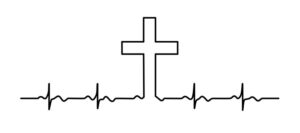
“Behold, I will bring it health and cure, and I will cure them, and will reveal unto them the abundance of peace and truth.”
~ Jeremiah 33:6
Disease and afflictions have plagued humans for our entire existence. If there’s anyone who needs the peace and good news of Christ, it’s someone who’s having health problems.
Today there’s modern medicine and a psychological understanding of how people cope. There’s also something we’ve had for the last few thousand years: Jesus and the Bible, which take care of the spiritual healing alongside our physical healing.
Explore a Christian Ministry Degree – Request More Info Today!
Working in hospital and healthcare ministry can be a very rewarding experience. You’re dealing with people who are suffering, feeling vulnerable, and down. They’re appreciative to have an empathetic ear and a caring person to lean on, especially when that person shares the hope and joy of the Lord.
There’s a long tradition of providing ministry in healthcare settings, stretching back to at least the time of Lazarus when his sisters implored Jesus to come and heal their ailing brother. This extends through the Knights Hospitaller in Jerusalem right through to the present day where modern pastors share the healing comfort of Christ with those who need it most.
What Is Hospital and Healthcare Ministry?
 Hospital and healthcare ministry is just that: sharing the power of Christ with someone who’s in the healthcare system. Healthcare ministry outreach is typically coordinated by churches with local hospitals and other healthcare facilities.
Hospital and healthcare ministry is just that: sharing the power of Christ with someone who’s in the healthcare system. Healthcare ministry outreach is typically coordinated by churches with local hospitals and other healthcare facilities.
Ministry could simply be in the form of companionship and a warm human presence, and it could also involve discussing spirituality, scripture, or topics that are uplifting.
There are many healthcare situations where this type of ministry could take place. Each setting and every person’s unique situation requires tact and skillful adaptation. Ministry in a children’s hospital will be different from ministry in a hospice setting.
It’s important to keep in mind there are many different branches of Christianity; there may be differences in interpretations and beliefs among those being ministered to in a healthcare setting.
There’s no need to take a discussion about God into controversial territory, and having an academic background in Christianity can help to avoid this. And anyway, the commonalities between all Christians –a belief in God, Jesus, and the Bible– far outweigh any differences.
In addition to a person’s reason for needing healthcare services, ministry can be tailored to people by broad categories like:
- Age group – Ministry for the elderly is going to be framed in a different way than ministry for young adults
- Culture – It’s important to have a general awareness of different cultural practices and beliefs
- Gender – In some cases ministry can be tailored to a person’s gender, such as situations involving motherhood, fatherhood, or if someone is suffering from an affliction that’s gender-specific
Anyone with a basic sense of empathy can provide ministry services for people with health problems. Person-to-person contact and the word of God can help people enhance their sense of self-worth and being cared for.
A cheerful heart is good medicine, but a crushed spirit dries up the bones.
~ Proverbs 17:22
What Exactly Do Pastors Who Specialize in Hospital and Healthcare Ministry Do?
 The best people for hospital and healthcare ministry are the ones with good interpersonal skills, empathy, and compassion. Nobody wants to have health problems and be stuck in a place that’s unfamiliar and removed from their everyday life habits. Bending an empathetic ear can make a world of difference.
The best people for hospital and healthcare ministry are the ones with good interpersonal skills, empathy, and compassion. Nobody wants to have health problems and be stuck in a place that’s unfamiliar and removed from their everyday life habits. Bending an empathetic ear can make a world of difference.
An important element of effectively engaging in this type of ministry is preparing ahead of time. Generally there are three broad topic categories you’ll cover when you’re visiting with a client:
General talk and conversation – This is how you’ll probably begin with your clients. Get to know them, what their home life is like, who their loved ones are, and so on. This is the part of the ministry relationship where you get comfortable with your client and they become comfortable with you.
The medical issue – The conversation will naturally move to this topic and it’s important that you handle this delicately. The client will likely need to vent and you should be prepared to engage in active and constructive listening when this happens. It may be helpful to interject a positive outlook and reasons for hope, but for the most part let the client do the talking. You may find that some health topics are uncomfortable but it’s important to get through these and maintain a client-centered focus.
Uplifting prayer – This is the part where knowledge of the Bible and historical Biblical figures can be helpful for developing uplifting analogies. If you’re part of a church outreach they will likely provide you with a collection of prayers that are related to health, wellness, healing, and being uplifted by Christ. After your visit your client should feel rejuvenated and equipped with strength to continue facing their medical challenge. For clients who are in a healthcare facility for a medium or long term it’s important that you establish a regular visitation schedule and stick to this.
There are many kinds of environments where you can engage in healthcare ministry, each of which will have some influence over how you approach the people you work with and the way you position your statements:
- Hospice setting or as part of end-of-life care
- Maternity ward where a family has just welcomed a new child into the world
- In-patient rehabilitation facility
- Long-term care facility
- Hospital or clinical waiting room
- Veterans' hospital or center
- Mental health facility
- In-patient hospital ward or department
- Children's hospital
- As part of an in-home healthcare visit
Anyone with a good heart and a decent streak of empathy can do well in healthcare ministry. However in most branches of Christianity there are some things that only a pastor can do. These might include:
- Administer communion
- Perform a ritual for death rites
- Baptism
- Hear confession
- Administer blessings
- Provide pastoral counseling
The Knights Hospitaller – A Medieval Military Religious Order Dedicated to Caring for Pilgrims
 Evoking images of knights clad in chain mail, mounted on horseback, and equipped with crucifixion-hilt longswords, the Knights Hospitaller were first established as a group of monks dedicated to providing healthcare services for Christian pilgrims to the Holy Land in the early 12th century after the First Crusade.
Evoking images of knights clad in chain mail, mounted on horseback, and equipped with crucifixion-hilt longswords, the Knights Hospitaller were first established as a group of monks dedicated to providing healthcare services for Christian pilgrims to the Holy Land in the early 12th century after the First Crusade.
Over the coming decades mission creep saw this monastic order’s duties to care for sick pilgrims in Jerusalem gradually expand. They went from providing medical services, to helping to build a hospital infirmary near the Church of the Holy Sepulchre, to providing armed escorts for pilgrims, to becoming a formidable military force alongside the Knights Templar near the end of the 12th century.
From here the Knights Hospitaller’s story takes a turn that’s worthy of a movie script: they supported Crusades, they defended against sieges from Saladin and Suleiman, they fought pirates, weathered several relocations, withstood the tumultuous times of the Reformation, and persevered through the concept of nationalism that began to sweep Europe in the 18th century.
In 1834 the Knights chose Rome as their new home, and re-focused themselves on their original task of staffing hospitals and providing healthcare.
Known today as the Sovereign Military Order of Malta, these 21st-century Knights maintain diplomatic relations with 107 nations and have permanent-observer status at the United Nations. They maintain an extensive network of medical professionals and volunteers who focus on providing services for war refugees, victims of natural disasters, and other vulnerable populations.
How Pastors and Other Christian Leaders Can Include Hospital and Healthcare Outreach in Their Ministry
Getting your foot in the door in this field is usually as easy as signing up with your church’s local outreach services. There’s no shortage of people in the healthcare system who need to hear God’s good news.
The CDC estimates there are about 1.3 million Americans in nursing homes across the nation. The American Hospital Association released a report in 2022 detailing there were more than 33 million people admitted to hospitals in 2020.
There’s a learning curve for hospital and healthcare ministry, and there are different positions within this field that demand increasing levels of responsibility.
Starting out, your first visits will give you a feel for how to break the ice, how to talk with people who are in a vulnerable position, and what strategies work best for praying together and improving morale.
Some people decide to stay at this level because they enjoy the personal connections they make with clients in the healthcare system.
Others may decide to expand their role and level of responsibility to become a healthcare ministry coordinator. You could move up to this position once you’ve gained experience and know the ins and outs of how outreach ministry at your church works.
As a coordinator you’ll schedule healthcare outreaches and be responsible for filling in when another person can’t make an outreach appointment. As you gain more experience you’ll also develop useful skills for quickly breaking the ice and making deep connections, getting a sense for how to quickly boost their spirits.
The most senior position in hospital and healthcare ministry is that of pastor. Depending on how big your church is, it may have pastors devoted entirely to healthcare ministry and outreach. For others, this may be a part of an array of duties. Depending on the denomination, pastors are uniquely qualified to perform special religious duties like baptisms, confessions, death rites, and pastoral counseling.
If you choose to move up through this progression from initiate to coordinator to pastor, the main factor that changes over time is experience. Education can also be helpful, and is a requirement in many denominations if you want to become a pastor.
When it comes to gaining a helpful grounding in the Bible and Jesus that’s useful for identifying a Christian basis for hope and inspiration when you’re praying with your clients, you can find relevant bachelor’s programs in subjects like:
- Pastoral ministries
- Religious studies
- Christian ministry
- Theological studies
- Biblical studies
If your ultimate goal is to become a pastor then earning a graduate degree is a good idea; programs like a Master of Divinity fulfill the education requirements for ordainment in several branches of Christianity. You can find relevant graduate programs focusing on topics like:
- Transformative ministry
- Theology
- Bible studies
- Pastoral care and chaplaincy
- Healthcare chaplaincy









